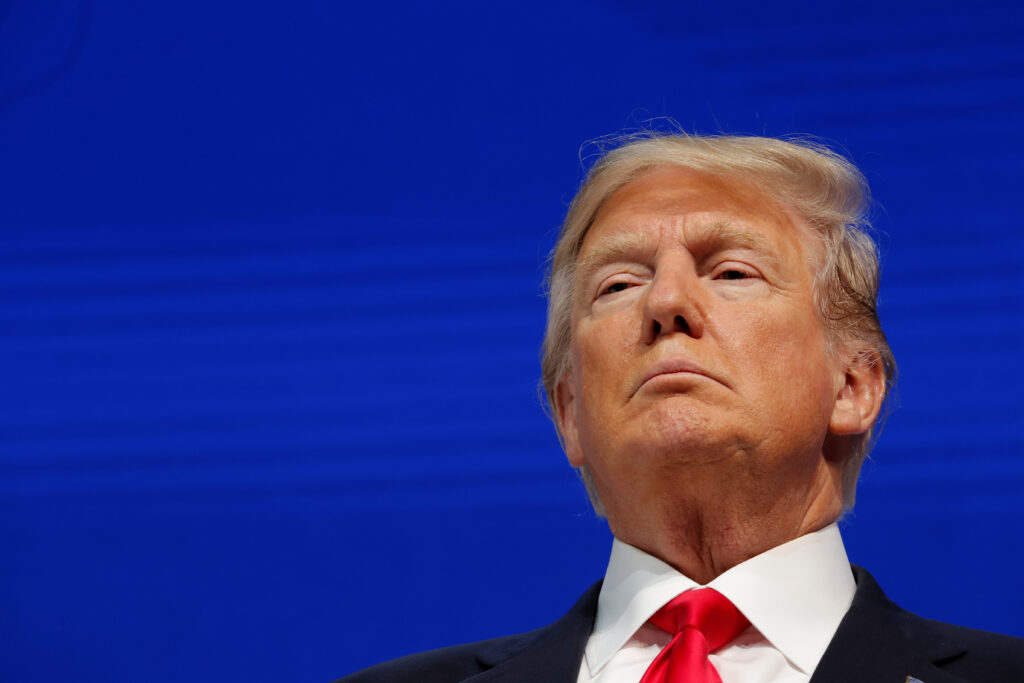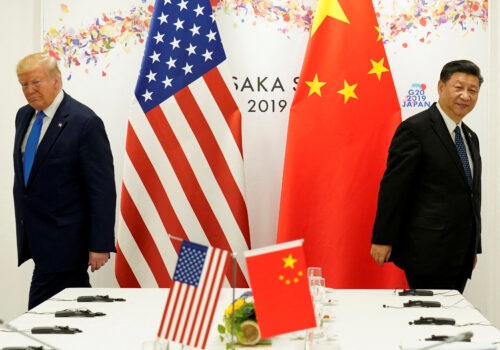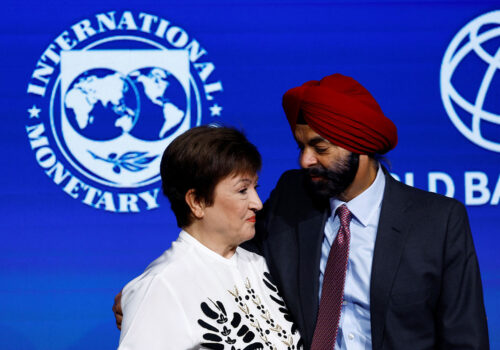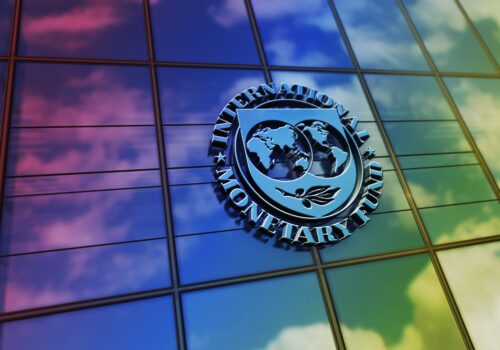For the International Monetary Fund (IMF) and World Bank, the election of Donald Trump as US president in 2016 seemed to present an existential question. If their largest shareholder was going to be led by a tariff-wielding economic nationalist, what would it mean for the future of the multilateral financial architecture, of which they were a key part?
The answer, it turned out, was more benign than what had been feared at the time. Like its predecessors, the Trump administration quickly realized that the two institutions provided the United States with financial leverage to pursue its global objectives, including by assisting friendly countries that would otherwise depend mostly on Chinese lenders for support.
As a result, the collaboration between the two institutions and the Trump administration mostly followed established processes, including in the Group of Seven (G7) and Group of Twenty (G20), where US priorities were quietly negotiated with staff and other shareholders. The administration also lobbied Congress to keep up US financial contributions to the institutions, both for the World Bank’s regular International Development Association replenishment (subsidizing loans to poor countries) and the IMF’s New Arrangements to Borrow (which added to the IMF’s lending capacity on top of its permanent resources).
The IMF could face pressure to speak out against China’s large current account surplus.
As Trump prepares to return to office, it would be tempting to expect a similar outcome, given the market-friendly appointments for economic positions so far (which calmed down speculation about a US withdrawal from the Bretton Woods institutions as proposed by the Heritage Foundation). Compared to 2016, however, the geopolitical rivalry between the United States, China, and other autocracies has become more intense. Trump has already announced plans for new tariffs on China, and Beijing has halted exports of some rare minerals in retaliation to US chip restrictions. As a result, the next US-China trade dispute could be much larger in scope. If it spilled over into areas under the mandate of the Bretton Woods twins, then the United States could push them, especially the IMF, to provide more explicit support for its positions.
One of the key planks of a future Trump administration could be an attempt to boost domestic exports by lowering the external value of the dollar. This could affect all countries with a large current account surplus (such as Germany and South Korea), but US policy is likely to focus predominantly on Beijing’s recent manufacturing offensive. The IMF could face pressure to speak out against China’s large current account surplus, providing intellectual support for the country being designated as a “currency manipulator” by the US Treasury Department, which could lead to the imposition of retaliatory tariffs.
Going even further, the United States could also nudge the IMF to declare China a currency manipulator itself, which would put China’s trade and exchange rate pressures under a multilateral spotlight. Per its “Integrated Surveillance Decision,” the IMF would have to find that China was conducting its exchange rate policy with the sole objective of securing a “fundamental exchange rate misalignment” for the purpose of an increase in net exports. This would be a high bar to clear given the views expressed in the IMF’s 2024 External Sector Report and a recent blog post by a group of senior directors that blamed domestic policies on both sides of the Pacific Ocean for the increase in global current account imbalances.
Moreover, the United States would not find many allies on this issue among the IMF’s other shareholders, let alone emerging markets, which could lead to a divisive standoff in the otherwise consensus-oriented institution. In 2007, for example, an earlier initiative by the George W. Bush administration to label China as a currency manipulator backfired when Beijing refused to publish its annual IMF consultations for two years—until the issue was resolved by the global financial crisis.
A similar shift in intensity could also take place regarding the two institutions’ lending activities. The United States under Trump did not lean particularly heavily on the IMF to lend to specific countries, even when it came to Argentina. That was because, at first, there was broad support within the IMF for the reformist Macri government, and when economic developments turned sour, the United States was not the only country reluctant to pull the plug on an ongoing program.
Going forward, however, the next Trump White House could push the IMF more actively to provide Argentine President Javier Milei, a Trump political ally, with additional foreign exchange reserves to prevent a run on the peso in case capital controls are lifted. Other leaders the administration views favorably might hope for similar support in the event of economic difficulties. The danger here is clear: unless the fund’s management and other shareholders were to resist politically motivated loans, the risks to the IMF’s balance sheet could significantly increase. Another large, failed loan to Argentina, for example, could trigger questions about the official reserve status of claims on the IMF, which is at the core of its financial business model.
On the other hand, the new administration could prove more allergic than before to helping developing countries with large outstanding loans to China, pushing more aggressively for debt restructurings before new loans are approved. Getting China to participate more actively in debt restructuring cases would indeed be beneficial for most countries, but the Trump administration should be clear-eyed about the nature of the challenge. Barring financial support from, and stepped-up trade opportunities with, the United States and other countries, few countries would go into arrears to Chinese lenders, which might be the only way to convince Beijing to provide development loans at truly concessional terms.
Both the IMF and World Bank are also likely to face greater scrutiny for their climate-related lending activities. While a wholesale reversal of existing policies may not be high enough on the new administration’s agenda, the potential choice of new personnel at the heads of both institutions could have significant implications. For example, the Trump administration could appoint a new World Bank president, which has traditionally been a US prerogative. However, it could face significant pushback if it were to remove Ajay Banga, the highly effective incumbent, in favor of a candidate modeled on his immediate predecessor, David Malpass.
At the IMF, the United States traditionally chooses a candidate for the number two position but cannot impose a change unless Kristalina Georgieva, its managing director, agrees. Given the unease over the IMF’s move into climate and development finance even within the Biden administration, this could become an early point of friction. The new administration will have a lever to request some changes in the institution, as it has to shepherd the ratification of the IMF’s 2023 capital (or “quota”) increase through Congress (which already missed the original deadline of November 15, 2024). Amid the chatter in Washington of a radical overhaul of the US government, it may even be possible that the gentlemen’s agreement between the United States and Europe of not interfering with each other’s personnel choices (which has been broken before) is up for the chopping block.
Martin Mühleisen is a nonresident senior fellow at the Atlantic Council’s GeoEconomics Center and a former IMF official with decades of experience in economic crisis management and financial diplomacy.
Further reading
Wed, Nov 13, 2024
The Trump trade wars are coming back. Here’s what to expect this time.
New Atlanticist By Josh Lipsky
Donald Trump’s belief in tariffs is deeply rooted, and the incoming president is resolved to fill out his administration with those who will support his vision on trade.
Mon, Oct 21, 2024
Get an inside look at the IMF-World Bank meetings as finance leaders navigate a geopolitically fragmented world
Bretton Woods 2.0 By
To gauge whether delegates can revive the world's spirit of cooperation at the IMF-World Bank Annual Meetings, we sent our experts to the center of the action in Foggy Bottom.
Fri, Oct 4, 2024
The IMF needs to find its geopolitical bearing
Econographics By Martin Mühleisen
Western delegates should think hard about how the financial and intellectual capital invested in the institutions can be put to better use in the interests of democracies around the world.
Image: US President Donald Trump looks on during the World Economic Forum (WEF) annual meeting in Davos, Switzerland January 26, 2018. REUTERS/Carlos Barria



